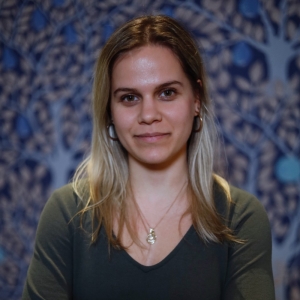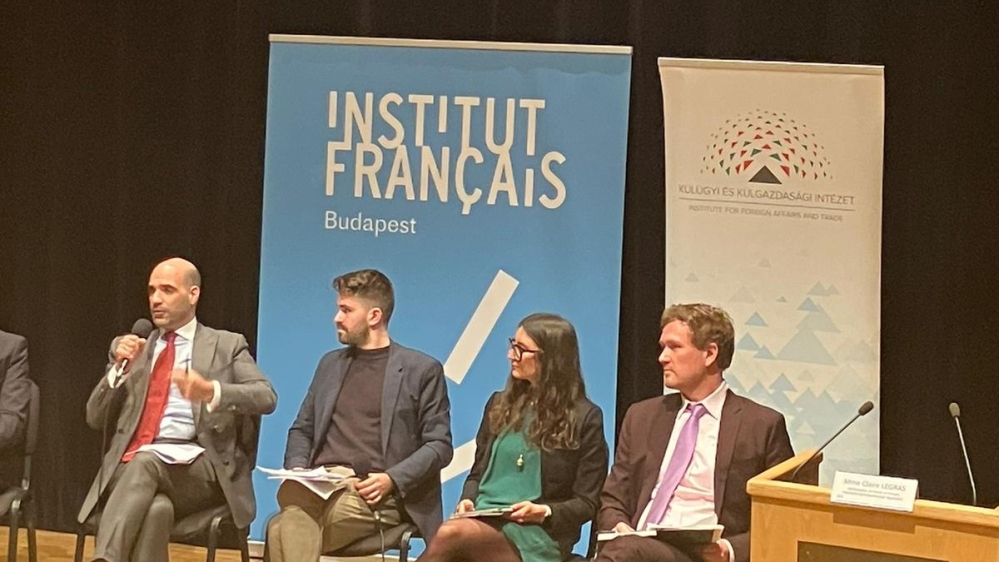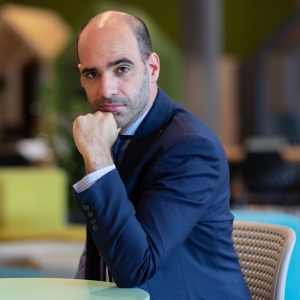Reading time: 2 minutes
The event « Communauté politique européenne, élargissement, défense… Quel tournant pour l'Europe géopolitique ? » organised by the French Institute and the Institute for Foreign Affairs and Trade was attended by the Head of our Centre, Rodrigo Ballester. The event, held in French, explored the concept of a European Political Community announced by Emmanuel Macron on 9 May 2022, and the geopolitics of Europe and the European Union and its changes in the light of the war between Russia and Ukraine. The event included introductory speeches by Claire Legras, Ambassador of France to Hungary, Levente Magyar, Deputy Minister of the Ministry of Foreign Affairs and Trade, and Márton Schőberl, Head of the Institute for Foreign Affairs and Trade.
The participants of the panel discussion:
- Gesine Weber, Fellow at the German Marshall Fund of the United States, Paris
- Rodrigo Ballester, Head of the Centre for European Studies, MCC, Budapest
- Gergely Fejérdy, Senior Research Fellow at the Institute for Foreign Affairs and Trade (IFAT), vice-director of otto von Habsbourg Foundation, Budapest
- Clotilde Warin, Policy Advisor at the Centre d'analyse, de prévision et de stratégie (CAPS), French Ministry for Europe and Foreign Affaires, Paris
- Florent Marciacq, Deputy Secretary General of the Austro-French Centre for Rapprochement in Europe, Vienna/Paris
- Moderator: Romain le Quiniou, Director of Eurocréative, Paris
During the round table discussion, the participants discussed the importance of strategic sovereignty and the shift in Europe's centre of gravity from the West towards Central Europe. Gesine Weber stressed that this is rather a rebalancing, as Central and Eastern European countries are now also making their voices heard in political debates. On enlargement policy, the panellists also expressed their different views. For Florent Marciacq, enlargement policy is something human, and cannot be linked to politics or geopolitics. Rodrigo Ballester stressed that for him, the EU's primary value should be pragmatism, and therefore enlargement policy is also a geopolitical issue. He stressed that in 2019, after that France, the Netherlands and Denmark, vetoed the opening of accession negotiations with Albania and Northern Macedonia, the European Commission has introduced a number of substantive changes to the accession process. Turning to the concept of the European Political Community (EPC), Clotilde Warin stressed that the details of the idea put forward by Emmanuel Macron are not yet known and that the states would be curious to know the details, "instructions", but so far it is a broadly interpreted concept. According to Gergely Fejérdy, Hungary and the Hungarian Government support the creation of the EPC, as it would allow, among other things, closer cooperation with the United Kingdom, with whom Hungary has a good relationship.
 Lívia Pavelka
Lívia Pavelka

